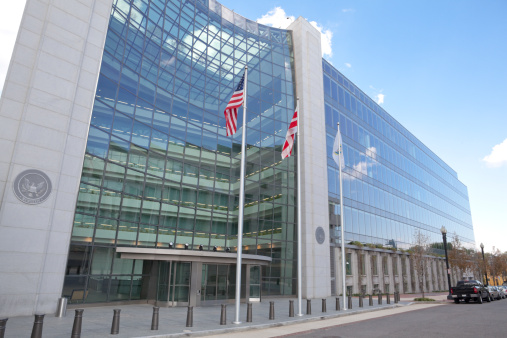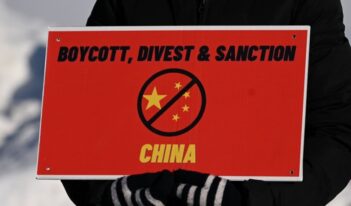
International accounting firms remain stuck between Chinese and U.S. law.
Tensions between U.S. and Chinese regulators remain unresolved, one month after an administrative law judge suspended Chinese affiliates of the “Big Four” accounting firms for withholding client audits. The judge’s suspension order highlighted tensions between U.S. disclosure laws and Chinese state privacy laws, and it exemplified some of the jurisdictional difficulties arising in international regulatory work.
The suspended firms are affiliates of Ernst & Young, KPMG, Deloitte, and PricewaterhouseCoopers—international accounting firms collectively known as the “Big Four.” The Securities and Exchange Commission (SEC) charged the affiliates with willful refusal to provide audits on several of their business clients in connection with an SEC investigation. The firms responded to the charge by citing China’s prohibitive secrecy laws, which might render officers from the Big Four criminally liable for disclosures to the SEC.
In his final opinion, the administrative law judge determined that Big Four affiliates in China have an obligation to provide the SEC with audits on companies that do business in China but issue securities in the United States. The SEC charged the affiliates with violating the Sarbanes-Oxley Act, under which penalties resulting from a corporation’s “willful refusal to comply” are implicated whenever a firm refuses to provide requested documents—regardless of their motives for doing so. The judge’s opinion stressed that good intentions, and the need to comply with foreign laws, are not factors that absolve firms of their responsibility to disclose information to the SEC under U.S. law.
With an imminent six-month suspension, the firms recently filed an appeal with the SEC in an attempt to dissuade the agency from implementing the penalty, citing the potential for sweeping damage to U.S. multinational companies and U.S.-traded Chinese businesses that will need to make alternative auditing arrangements in the interim.
The SEC noted it was pursuing the firms directly, rather than engaging with their Chinese regulatory counterparts, since these regulators “remain unwilling or unable to provide the SEC with meaningful assistance in its enforcement investigations.” Shortly after the judicial opinion was released, Deng Ge, a spokesperson from the China Securities Regulatory Commission (CSRC) publicly expressed “deep regret” over the decision. “The SEC’s ruling disregards Chinese regulator’s efforts to hand over audit documents,” Ge stated.
At this time, it remains uncertain whether these two regulators will take additional steps to resolve tensions—or whether they can at all. The SEC and the CSRC have publicly acknowledged their willingness to collaborate in regulating securities markets. However, a solution may remain elusive since the conflict stems from statutory provisions rather than agency policy.
Currently, both regulators have a Memorandum of Understanding (MOU) in place to encourage cooperation. Providing accounting audits to facilitate investigations would fall under the scope of the MOU. According to the MOU, however, local regulators can withhold assistance during investigations, if that assistance conflicts with domestic law or the undefined “public interest.”
With firms in the accounting sector, the domestic laws in question involve Chinese state secrecy laws. According to revisions to these laws that went into effect in 2010, any information that has “a vital bearing” on national interests can be deemed a state secret. This includes information relating to “national economic and social development.” Thus, the Chinese securities regulator could withhold documents on any business being investigated by the SEC, while still abiding by the MOU, if these documents are determined to contain state secrets. Commentators have speculated that close relationships between Chinese-based companies and the Chinese government increase the likelihood that business audits might contain information that falls under this expansive definition of “state secrets.”
Prior to the SEC’s action, accounting firms in China arguably had few incentives to turn over audits that fell into the statutory definition of “state secrets.” By releasing business audits to foreign securities regulators like the SEC, these firms could violate a duty to protect state secrets. The result would be criminal liability, with penalties that could extend to life imprisonment for individuals employed at these firms.
The situation has been particularly difficult in light of reports of high-profile accounting scandals in China in recent years. These scandals have apparently raised questions about the quality and veracity of some business audits performed by affiliates of the “Big Four.” Irregularities in business audits are particularly important to the SEC, since they could signal a wide variety of criminal activity, including fraud and embezzlement.
Following the scandals, at least one additional securities regulator responded to Chinese secrecy laws by taking legal action against accounting firms serving dually-registered companies. In 2012, Hong Kong’s Securities and Futures Commission initiated administrative proceedings against Ernst & Young for allegedly refusing to provide corporate records. Like in the SEC case, Ernst & Young argued that state secrecy laws prevented any disclosure.
Accounting firms are not the only entities closely watching these developments. How regulators resolve disclosure tensions will have broad implications for international businesses.
Some businesses operating in both China and the United States have expressed an immediate concern over the SEC decision. They fear the decision will make it difficult to find auditors that can satisfy both the SEC disclosure requirements and Chinese privacy laws.
The decision may also affect how businesses approach compliance. Commentators predict a reduction in dually-listed companies if both national regulators hold firm. Some are predicting Chinese companies will avoid public offerings in the U.S. in order to avoid U.S. business transparency and disclosure laws like the Sarbanes-Oxley Act. Others are predicting an increase in American companies holding initial public offerings in Hong Kong—a jurisdiction without state secrecy laws.



